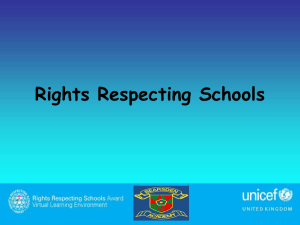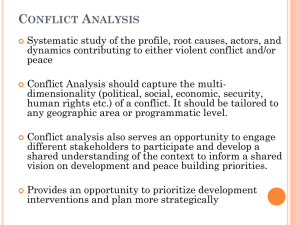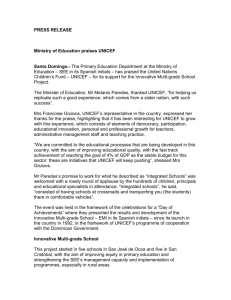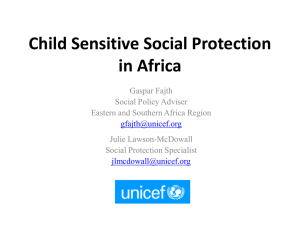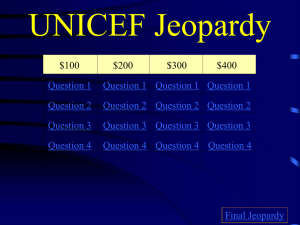Terms of Reference
advertisement
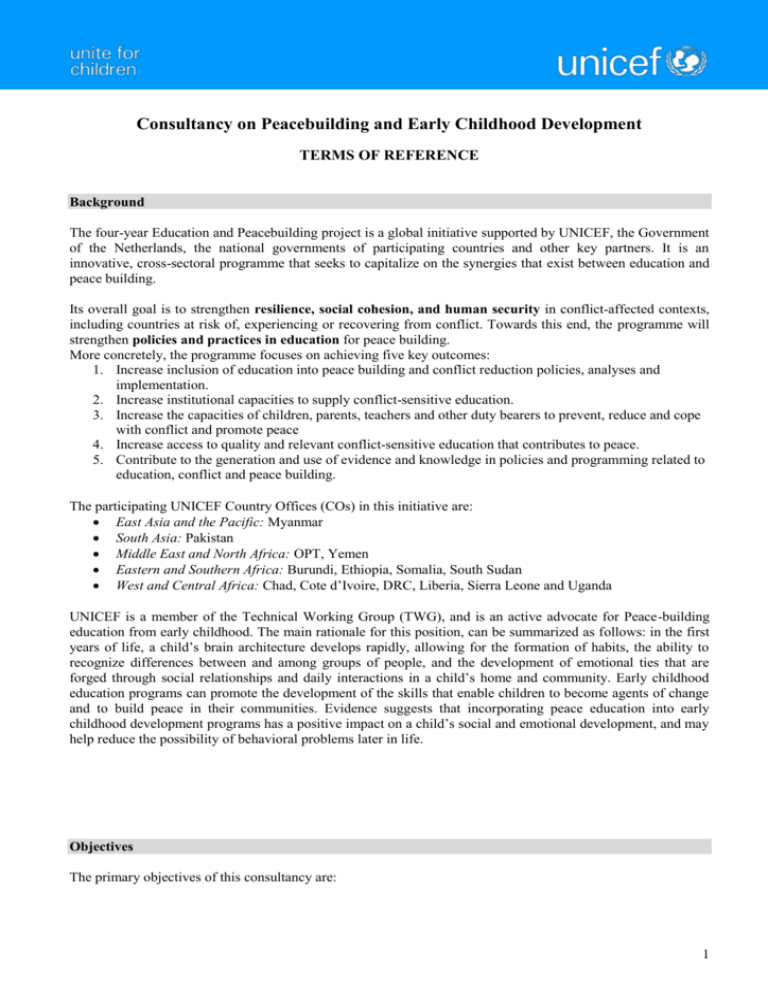
Consultancy on Peacebuilding and Early Childhood Development TERMS OF REFERENCE Background The four-year Education and Peacebuilding project is a global initiative supported by UNICEF, the Government of the Netherlands, the national governments of participating countries and other key partners. It is an innovative, cross-sectoral programme that seeks to capitalize on the synergies that exist between education and peace building. Its overall goal is to strengthen resilience, social cohesion, and human security in conflict-affected contexts, including countries at risk of, experiencing or recovering from conflict. Towards this end, the programme will strengthen policies and practices in education for peace building. More concretely, the programme focuses on achieving five key outcomes: 1. Increase inclusion of education into peace building and conflict reduction policies, analyses and implementation. 2. Increase institutional capacities to supply conflict-sensitive education. 3. Increase the capacities of children, parents, teachers and other duty bearers to prevent, reduce and cope with conflict and promote peace 4. Increase access to quality and relevant conflict-sensitive education that contributes to peace. 5. Contribute to the generation and use of evidence and knowledge in policies and programming related to education, conflict and peace building. The participating UNICEF Country Offices (COs) in this initiative are: East Asia and the Pacific: Myanmar South Asia: Pakistan Middle East and North Africa: OPT, Yemen Eastern and Southern Africa: Burundi, Ethiopia, Somalia, South Sudan West and Central Africa: Chad, Cote d’Ivoire, DRC, Liberia, Sierra Leone and Uganda UNICEF is a member of the Technical Working Group (TWG), and is an active advocate for Peace-building education from early childhood. The main rationale for this position, can be summarized as follows: in the first years of life, a child’s brain architecture develops rapidly, allowing for the formation of habits, the ability to recognize differences between and among groups of people, and the development of emotional ties that are forged through social relationships and daily interactions in a child’s home and community. Early childhood education programs can promote the development of the skills that enable children to become agents of change and to build peace in their communities. Evidence suggests that incorporating peace education into early childhood development programs has a positive impact on a child’s social and emotional development, and may help reduce the possibility of behavioral problems later in life. Objectives The primary objectives of this consultancy are: 1 (i) (ii) (iii) (iv) To undertake, a five-to-ten year retrospective study of how early childhood development programmes have been integrated into UNICEF supported programmes and initiatives by other organizations/NGOs, etc. long-term development strategies and peace building processes around the world (with a focus on conflict affected countries) and what particular role early childhood development plays to build and sustain the foundations for cohesive and peaceful societies, primarily through a literature review exercise and interview selected people who have practical experience with early childhood development in conflict affected countries ; To identify, with reference to relevant research and technical literature, the Key Behavior Traits and Characteristics instrumental in promoting non- violence among young children and how that in turn can constitute the foundation for peace building. To identify the required preconditions and linkages between early childhood development and other types of programmes in conflict affected settings in order to enable early childhood development programmes make a strategic contribution to larger peace building processes. To update the existing ECD-in-Emergency training package (including the packages’ three guides: for Coordinators, Facilitators, Caregivers) with relevant content on the promotion of Peace building and non-violent behaviour in young children. To this end, the consultant will: Review existing evidence, information and materials from previous and current peace building efforts centered around young children; the consultant should make use of evidence, information and materials already available, rather than undertake primary research; Consult and seek inputs from experts working in this field, including INGO partners; Produce a report that includes: 1) a comprehensive and well-structured list of literature consulted and 2) summary of key behavior traits and characteristics critical for the promotion of peace building and non-violence among young children, and 2) a critical analysis of the findings and recommendations. Based on the identified key behavior traits and characteristics, update the ECD-in-Emergency training package in line with the current structure of the package. The consultant will be expected to liaise with other UNICEF consultants and specialists working in the PBE Project to maximize synergies and avoid duplication of efforts. Deliverables 1. A final report of 15- 20 pages; on literature review and key behaviour traits and characteristics 2. A final ECD-in-Emergencies training package ready for rollout 3. Presentation to the Technical Working Group and ROs/COs (via web platforms) on the findings and recommendations, with a view to obtain their feedback/inputs for the finalization of the report; 4. Webinar or presentation through other web-enabled platforms, for relevant UNICEF Country Offices and Regional Offices. Time Frame September - December 2012; 30 working days within this 4-month timeframe Tasks The consultant will be expected to undertake the following tasks: 1. Develop and agree on the overall framework and milestones for the consultancy (2 days) 2. Review background documents suggested by UNICEF, the ECD-in-Emergencies working group and partners (5 days) 3. Conduct/document a literature review (5 days) 4. Present first/second drafts of the report to ECD (2 days) 2 5. 6. 7. 8. 9. Present the first/second draft of the ECD-in Emergencies Training Package ( 10) Present the final training package ( 6 days) Present a final report (2 days) Make a presentation of consultancy’s results to TWG Conduct a webinar for CO/RO-based staff. The consultant will work identified partners actively involved in this field. Location The consultant does not have to be based in New York. The consultant can work remotely with regular consultation with the supervisor through Skype, internet, telephone and emails. Occasional face-to-face meetings may be required. Qualifications Advanced University degree in social sciences, Child Development, Education or any other related field. At least 5-8 years of solid professional experience in related fields Experience with peace building and conflict resolution efforts globally highly desirable Knowledge of and experience in the human rights-based approach to programming Strong research and analytical skills Excellent writing skills in the English language How to apply Qualified candidates are requested to submit a cover letter, CV, a sample of any written report that displays research, synthesis and analytical skills, and a signed P11 form (which can be downloaded from our website at http://www.unicef.org/about/employ/index_53129.html) to pdconsultants@unicef.org with subject line “Consultancy on Peacebuilding and Early Childhood Development” by September 28, 2012 Applications without a daily rate will not be considered. The following conditions of service apply to all individual consultants: 1. LEGAL STATUS Individuals engaged under a consultant contract serve in a personal capacity and not as representatives of a Government or of any other authority external to the United Nations. They are neither “staff members” under the Staff Regulations of the United Nations and UNICEF policies and procedures nor “officials” for the purpose of the Convention of 13 February 1946 on the privileges and immunities of the United Nations. Consultants may, however, be given the status of “experts on mission” in the sense of Section 22 of Article VI of the Convention. If they are required to travel on behalf of the United Nations, they may be given a United Nations certification in accordance with Section 26 of Article VII of the Convention. 2. OBLIGATIONS Consultants shall have the duty to respect the impartiality and independence of the United Nations and shall neither seek nor accept instructions regarding the services to be performed for UNICEF from any Government or from any authority external to the United Nations. During their period of service for UNICEF, consultants shall refrain from any conduct that would adversely reflect on the United Nations or UNICEF and shall not 3 engage in any activity that is incompatible with the discharge of their duties with the Organization. Consultants are required to exercise the utmost discretion in all matters of official business of the Organization. In particular, but without limiting the foregoing, consultants are expected to conduct themselves in a manner consistent with the Standards of Conduct in the International Civil Service. Consultants are to comply with the UNICEF Standards of Electronic Conduct and the requirements set forth in the Secretary General’s Bulletin on Special Measures for Protection from Sexual Exploitation and Sexual Abuse, both of which are incorporated by reference into the contract between the consultants and UNICEF. Unless otherwise authorized by the appropriate official in the office concerned, consultants shall not communicate at any time to the media or to any institution, person, Government or other authority external to UNICEF any information that has not been made public and which has become known to them by reason of their association with the United Nations. The consultant may not use such information without the written authorization of UNICEF. Nor shall the consultant use such information for private advantage. These obligations do not lapse upon cessation of service with UNICEF. 3. TITLE RIGHTS UNICEF shall be entitled to all property rights, including but not limited to patents, copyrights and trademarks, with regard to material which bears a direct relation to, or is made in consequence of, the services provided to the Organization by the consultant. At the request of UNICEF, the consultant shall assist in securing such property rights and transferring them to the Organization in compliance with the requirements of the applicable law. 4. TRAVEL If consultants are required by UNICEF to travel beyond commuting distance from their usual place of residence, such travel at the expense of UNICEF shall be governed by conditions equivalent to the relevant provisions of the 100 series of the United Nations Staff Rules (Chapter VII) and relevant UNICEF policies and procedures. Travel by air by the most direct and economical route is the normal mode for travel at the expense of UNICEF. Such travel will be by business class if the journey is nine hours or longer, and by economy class if the journey is less than nine hours, and first class by rail. 5. MEDICAL CLEARANCE Consultants expected to work in any office of the Organization shall be required to submit a statement of good health prior to commencement of work and to take full responsibility for the accuracy of that statement, including confirmation that they have been fully informed regarding inoculations required for the country or countries to which travel is authorized. 6. INSURANCE Consultants are fully responsible for arranging, at their own expense, such life, health and other forms of insurance covering the period of their services on behalf of UNICEF as they consider appropriate. Consultants are not eligible to participate in the life or health insurance schemes available to United Nations staff members. The responsibility of the United Nations and UNICEF is limited solely to the payment of compensation under the conditions described in paragraph 7 below. 7. SERVICE INCURRED DEATH, INJURY OR ILLNESS Consultants who are authorized to travel at UNICEF’s expense or who are required under the contract to perform their services in a United Nations or UNICEF office, or their dependants as appropriate, shall be entitled in the event of death, injury or illness attributable to the performance of services on behalf of UNICEF while in travel status or while working in an office of the Organization on official UNICEF business to compensation equivalent to the compensation which, under Appendix D to the United Nations Staff Rules (ST/SGB/Staff Rules/Appendix D/Rev.1 and Amend.1), would be payable to a staff member at step V of the First Officer (P-4) level of the Professional category. 4 8. ARBITRATION Any dispute arising out of or, in connexion with, this contract shall, if attempts at settlement by negotiation have failed, be submitted to arbitration in New York by a single arbitrator agreed to by both parties. Should the parties be unable to agree on a single arbitrator within thirty days of the request for arbitration, then each party shall proceed to appoint one arbitrator and the two arbitrators thus appointed shall agree on a third. Failing such agreement, either party may request the appointment of the third arbitrator by the President of the United Nations Administrative Tribunal. The decision rendered in the arbitration shall constitute final adjudication of the dispute. 9. TERMINATION OF CONTRACT This contract may be terminated by either party before the expiry date of the contract by giving notice in writing to the other party. The period of notice shall be five days in the case of contracts for a total period of less than two months and fourteen days in the case of contracts for a longer period; provided however that in the event of termination on the grounds of misconduct by the consultant, UNICEF shall be entitled to terminate the contract without notice. In the event of the contract being terminated prior to its due expiry date in this way, the consultant shall be compensated on a pro rata basis for no more than the actual amount of work performed to the satisfaction of UNICEF. Additional costs incurred by the United Nations resulting from the termination of the contract by the consultant may be withheld from any amount otherwise due to the consultant from UNICEF. 10. TAXATION The United Nations and UNICEF undertake no liability for taxes, duty or other contribution payable by the consultant on payments made under this contract. No statement of earnings will be issued by the United Nations or UNICEF to the consultant. 5



